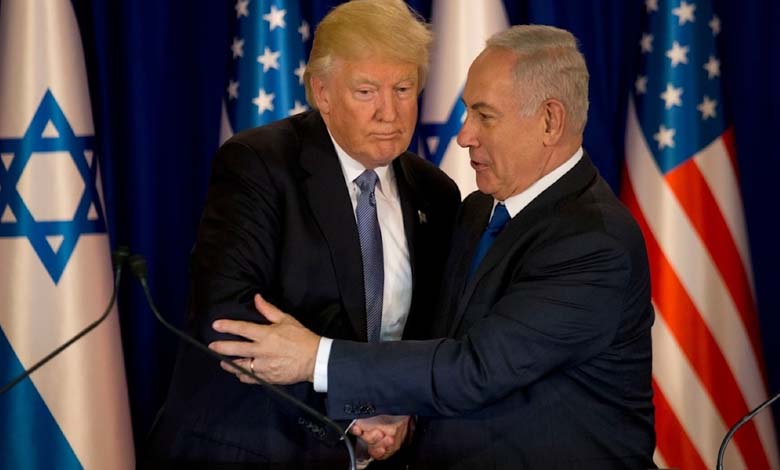Netanyahu denies Gaza famine, Trump responds… but the facts on the ground speak for themselves

When images expose the reality of hunger in Gaza, official statements become hollow echoes, even among allies. This is precisely what happened between Benjamin Netanyahu and Donald Trump.
The Israeli Prime Minister declared, “No one in Gaza is starving,” adding, “There is no starvation policy in Gaza. We have allowed humanitarian aid throughout the war—otherwise, there would be no Gazans left.”
Former U.S. President Donald Trump, however, contradicted Netanyahu‘s remarks, pointing to emaciated children in recent images, stating, “Those children look very hungry.”
-
Support is waning… A major shift in US Democrats’ stance toward Netanyahu
-
To Resolve the Gaza Truce Deadlock: A New Map on Netanyahu’s Table
Daily truces… are they enough?
Under mounting international pressure, Israel announced humanitarian pauses over the past weekend, along with air drops and other measures intended to facilitate aid delivery to Palestinians in Gaza.
But residents say these changes have brought little or no improvement on the ground in some areas. The United Nations described it as a one-week increase in aid, without clarification from Israel on how long these measures would last.
Israel claims Hamas is responsible for blocking aid from reaching the population, accusing its fighters of stealing supplies to bolster their control. The UN denies systematic looting, asserting that thefts decrease or cease when adequate aid flows into Gaza.
-
Trump: America Saved Israel and Will Protect Netanyahu from the Trial Farce
-
No Concessions… Netanyahu Sets Conditions for Palestinian Autonomy
Hunger in numbers
The World Health Organization reported 63 deaths linked to malnutrition in Gaza this month alone, including 24 children under the age of five—an increase from 11 deaths over the previous six months.
Gaza’s Ministry of Health provided higher numbers, citing 82 malnutrition-related deaths this month: 24 children and 58 adults. On Monday alone, the ministry reported 14 additional deaths.
Friends of the Patient Hospital, Gaza’s main emergency center for malnourished children, reported this month that children with no prior health conditions died of starvation for the first time.
-
Netanyahu Urges Iranians to Rebel Against Regime Following Unprecedented Strikes
-
Trump Hints at Good News on Gaza as Netanyahu Hosts U.S. Security Official
Some adult victims had underlying conditions like diabetes or heart and kidney disease worsened by hunger, according to local health officials.
The WHO said acute malnutrition has tripled in northern Gaza this month, now affecting nearly one in five children under five. Similar trends have been seen in central and southern Gaza.
The UN reports that the only four nutrition treatment centers in Gaza are “overwhelmed.”
The Integrated Food Security Phase Classification (IPC), a leading global authority on food crises, has warned for months of looming famine in Gaza. It has not formally declared famine, citing limited access to data due to Israeli-imposed restrictions.
-
Western Sanctions Threats on Israel Rattle Netanyahu
-
More than Half of Gaza under Netanyahu’s Control… Morag Encircles Rafah to ‘Strangle’ Hamas
Aid looted before it arrives
Israel announced on Saturday 10-hour daily humanitarian truces in three densely populated zones to allow UN food trucks to operate.
However, Martin Penner, spokesperson for the UN’s World Food Programme, said that all 55 of the agency’s trucks that entered Gaza on Monday through Zikim and Kerem Shalom were looted by starving civilians before reaching UN warehouses.
Palestinians are calling for a full return to the UN-led aid distribution system used throughout the war, rather than the Israeli-supported mechanism introduced last May.
-
Hamas Hezbollah and Houthis: Netanyahu Unveils His Vision to End the Gaza War
-
Fifth Prisoner Exchange: Messages to Trump and Netanyahu
Witnesses and health workers told the Associated Press that Israeli forces have shot and killed hundreds of Palestinians trying to access food distribution points or rushing aid trucks. The Israeli military says it fired warning shots to disperse perceived threats.
The UN and its partners consider trucks the most effective way to deliver aid, urging Israel to relax entry restrictions. Each truck carries approximately 19 tons of supplies.
According to the Israeli military, 95,435 aid trucks entered Gaza by July 21 since the war began, averaging 146 per day—far below the 500 to 600 trucks per day that the UN says are needed.
This number has often fallen to half that amount for consecutive months. No aid entered Gaza for two and a half months starting in March due to a complete Israeli blockade.
-
“Endless Wars” for Power: What Netanyahu Wants from Gaza and Lebanon
-
New Leak Scandal Shakes Netanyahu’s Government
Aid delivery increasingly difficult and slow
The UN says humanitarian delivery into Gaza has become increasingly difficult.
Once aid enters Gaza, it is left near the borders. The UN must then obtain Israeli military permission to dispatch its trucks for collection.
The organization states that over the past three months, the Israeli military has denied or delayed just over half of these movement requests.
Even when successful, UN convoys are sometimes attacked by armed gangs or desperate crowds, according to the Associated Press.












